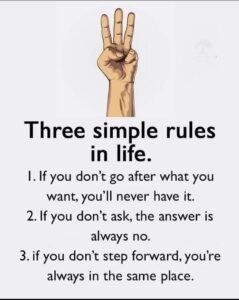Among the most difficult choices one has to occasionally make, apologizing perhaps ranks pretty high on most people’s list. As honest, good and objective individuals we would unhesitatingly state that if we are on the wrong we will always offer an apology. The reality though is quite different.
Here are 4 reasons why we find it hard to offer a simple unconditional apology when required.
We find it hard to accept our mistake. E.g. Despite a frantic search you are unable to locate your set of keys at home. You are in a rush as you are getting late for office. You have in your anger and frustration also accused all and sundry at home that they could have possibly had a hand in the disappearance of the keys. On reaching office you see the set of keys lying in the office drawer. You sheepishly think of apologizing to those at home but then let it pass for it would then mean accepting your mistakes; first of being responsible for the problem; for blaming those at home; for creating a scene etc.
We tend to play down the happenings and attempt to justify/ rationalize it. E.g. in an examination you have strategically placed you answer paper to let the candidate seated behind you copy from it. The invigilator who notices this tactical but unethical arrangement warns both the candidate behind you and you of stern action. You remonstrate that it is the person behind who is copying and that you are blameless.
We mistakenly believe that an apology is equivalent to admitting a fault. E.g. As children we have often squabbled with our siblings or playmates. When the situations got unruly the elders intervened and then there was a blame game that was never ending with no one wanting to apologize. The genesis is the mistaken notion that an apology immediately implies our guilt.
We pamper our ego and forget the importance of relationships. E.g. We have under a mistaken notion launched a tirade against a subordinate who for fear of more drastic retribution meekly submits to the barraging. Later when we get the facts fully and realize our mistake find it ‘humiliating ‘ to admit our fault and worse still ‘apologize’ to a subordinate.
Here are 3 ways to smoothly embrace an apology as a mature decision.
Remember that saying sorry is the simplest form of apology. Sorry forms part of the trio of Please and Thank you which are the 3 magical words in English that smoothen life.
An apology often helps us start gain with a clean slate. While some scars may remain, the wound is by and large healed and ‘all is well that ends well’ since an apology puts an end to the hurt, resentment and anger that may have been in the air.
An apology at the appropriate time, to the right person in the right manner for the right reason, is a test of your character, a critical component of leadership and a reflection of your personality.
Here let me offer my apologies to…
You my reader for the long delayed post which was actually written 10 days ago. Unfortunately due an oversight I didn’t save the same and I lost the entire file when the computer crashed. What you are reading now is a completely new post than what was originally written.
I need to apologize to my immediate family members who had to bear the brunt of my wrath for the post that was lost to the computer crash. The fault was entirely mine, but in my human weakness I raved and ranted and unburdened myself on all those who unwittingly crossed my path in the immediate aftermath of my disaster.
My apologizes to a couple of well meaning friends who politely inquired about my posts but had to bear the brunt of my ire for I had been rather curt and brusque to them when narrating what happened. I think I was also selfish enough to expect more sympathy from them and perhaps that aggravated my irrational behavior at their well intentioned and polite inquires.
Try this:
- Name 3 people who deserve an apology from you. Pick up courage to apologize to them even if a lot of time has elapsed since the original event happened.
- Can you identify with some of these situations when you felt apologetic about your own response to the situation
- You did not make enough efforts to cast your vote
- You told a deliberate lie for fear of the consequences
- You harbored ill will against someone who wronged you
- You shielded someone from being justly punished/ reprimanded simply because you shared a close relationship or friendship with him/ her
This post is courtesy www.actspot.com
You are also invited to visit our Inspirational and Motivational Blog







This Post Has 4 Comments
Excellent Article, Will definetly help us to transform our relationship with everyone in our circle of relationships.
Thank you
Thank you Vikas for your feedback, appreciation and for rating the post. Do continue to take time out to give your feedback and suggestions / observations if any. Regards Jacob
Yes, I agree with you. But people are not like what you (we) expect. they do not even realize that there is a fault on them. There is a limit for anything and everthing. You can talk to people, counsel them, send them to training prog (for attitude change), give them exposure, send them daily quote, tell them politely the need for a change (in them), reprimand them at times; but still people do not seem to have changed.
I lose patience with those people. I just stopped talking to them, as I told you earlier, there is a limit for everything. (Probably, I am not efficiencint enought to bring in a change in them).
What to do with these people? I strongly believe one can turn even the Himalayas upside down with a right attitude, do you agree? Attitude is a fundamental for everything. It is the necleus. Your entire life is woven around it. Human being is like a computer. The body is hardware, the attitude (or thoughts) in it is software or the processor (pentium?!!). Speed of the computer is decided by the software or the capacity of the processor inside, you agree? So also, the software – the thoughts or the attitudes in you – decides your speed, your worth, your intelligence, your strength, your success and what not.
If people do not understand the basics, what is our responsibility. I know changing self is easier. And I cannot expect others to change.
What is your idea on this?
Balaji
Hi Balaji,
First of all thank you for taking time out to comment on the blog post. I also appreciate the fact that you have expressed / shared your concerns/apprehensions in dealing with people and sought my views on it.
To begin with each individual has a different tolerance level and so some individuals are short tempered, others more patient and some others absolutely indifferent. Your reactions are an outcome of your personal tolerance level so you nee not feel guilty about it. You also have every right to feel aggrieved at the attitude of those who in your opinion have been given ample support and guidance but have remained dogmatic and refuse to improve.
In conclusion you have the responsibility of trying to help people change their attitude and make it more positive, solution oriented and self driven but you are under no obligation to bring about a change in their lives. As you correctly concluded it is easier to change one’s own self than expect others to change.
There is one thing that you must keep in mind though and that is you need to be the example that others will notice and emulate. It is in influencing others by excelling in setting standards ourselves that we will realize our own potential and become change agents.
Regards
Jacob